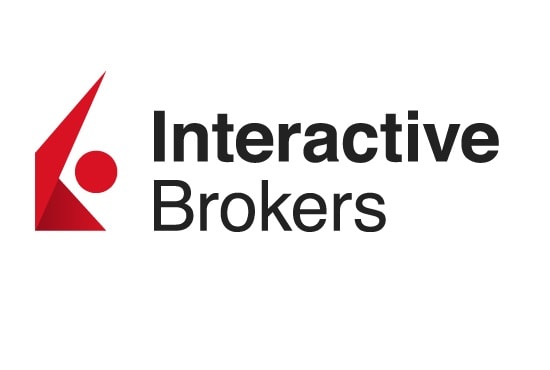Robinhood | Interactive Brokers | |
Monthly Fee | $0 – $6.99
$0 for basic account, $6.99 for Robinhood Gold | 0% – 0.75%
$0 online commission on U.S. listed stocks and ETFs, Options: $0.15 – $0.65 per-contract, Futures: $0.25 – $0.85 per-contract. For Interactive Advisors: asset-based management fees of 0.10% to 0.75% |
Account Types | Brokerage, Retirement, Crypto | Brokerage, Retirement |
Savings APY | 3.75%
| 0.00% – 3.190%
|
Minimum Deposit | $0 | $0 |
Best For | Active Traders, Tech Savvy Investors | International Investors, Advanced Traders |
Read Review | Read Review |
Robinhood vs Interactive Brokers: Compare Features
IBKR surpasses Robinhood in its access to global markets, providing a wider range of assets like bonds, forex, and international stocks, which gives investors more options to diversify.
Interactive Brokers | Robinhood | |
|---|---|---|
Investing Options | Full Access To Almost Any Asset | Over 5,000 securities, most U.S. stocks and ETFs listed on U.S. exchanges |
Investing Types | Stocks, Options, Futures, ETFs, Crypto, Bonds & CDs, Margin, Mutual Funds, Hedge funds, Forex, Commodities | Stocks, Options, Futures, ETFs, Crypto, Margin, Fractional Shares |
Automated Investing | Yes | No |
Paper Trading | Yes | No |
IPO Access | No | Yes |
Dedicated Advisor | No | No |
However, where Robinhood shines is in its approachability and mobile app experience, making self-directed investing accessible on the go.
-
Self Investing And Fundamental Analysis Options
Interactive Brokers is our winner when it comes to self-investing due to its broader investment types, access, and analysis options.

IBKR is a powerhouse for both new and experienced investors. Investors can trade stocks, options, futures, forex, bonds, ETFs, and mutual funds, along with access to global markets in over 150 countries.

IBKR also provides a vast selection of global markets and asset classes, offering unmatched access for those interested in international investing.

Furthermore, IBKR’s research tools, including the IBKR Global Analyst and PortfolioAnalyst, allow for deep dives into financial data, which is invaluable for meticulous fundamental analysis.

Robinhood excels in simplicity and ease of use, making it ideal for newer investors who want a straightforward, commission-free trading experience.

Its platform is highly intuitive, with user-friendly charts and basic fundamental data that are easy to navigate, making stock analysis accessible to everyone.
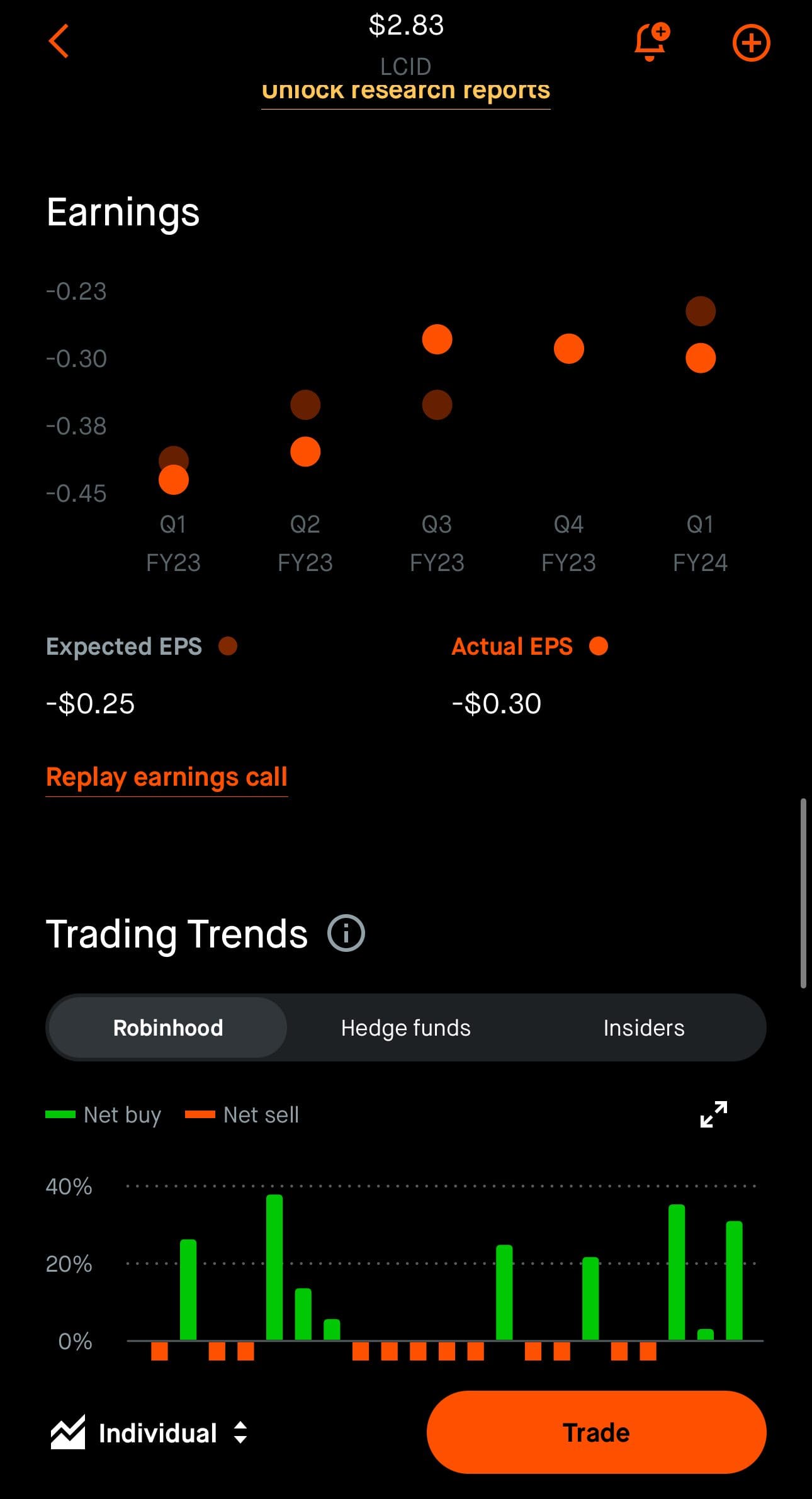
-
Trading Options And Technical Analysis Tools
Interactive Brokers is our winner when it comes to trading options and tools for traders, as it offers more advanced tools than Robinhood. However, the Robinhood user interface is much more comfortable.
Robinhood also offers basic technical analysis tools, including charts and indicators like moving averages, but these features are relatively limited in scope.

Its trading interface is clean and straightforward, allowing users to execute trades quickly.

In contrast, IBKR stands out with its Trader Workstation (TWS), which is designed for the advanced trader with over 100 technical indicators are available, including moving averages, Bollinger Bands, RSI, MACD, and more, enabling traders to conduct in-depth analysis of market trends.

The platform also supports advanced charting features like backtesting, which allows traders to test their strategies against historical data to evaluate their effectiveness.

Additionally, TWS offers real-time data feeds and pattern recognition tools that can automatically detect chart patterns like head and shoulders, triangles, and trendlines, helping traders identify potential trading opportunities.
-
Robo Advisor And Automated Investing
Only IBKR offers robo advisors at this moment.
IBKR’s automated investing service, Interactive Advisors, caters to investors who desire more customization and control, even within a robo-advisor framework.

Interactive Advisors offers a variety of portfolios that are color-coded by risk level and investment style, allowing investors to choose from a wide range of strategies, including socially responsible and income-generating portfolios.

The entry point is low, with a minimum investment of just $100, and fees range up to 0.75% depending on the portfolio.
Robinhood doesn't actually offer a robo-advisor or automated investing options, which means users must manually select and manage their investments.
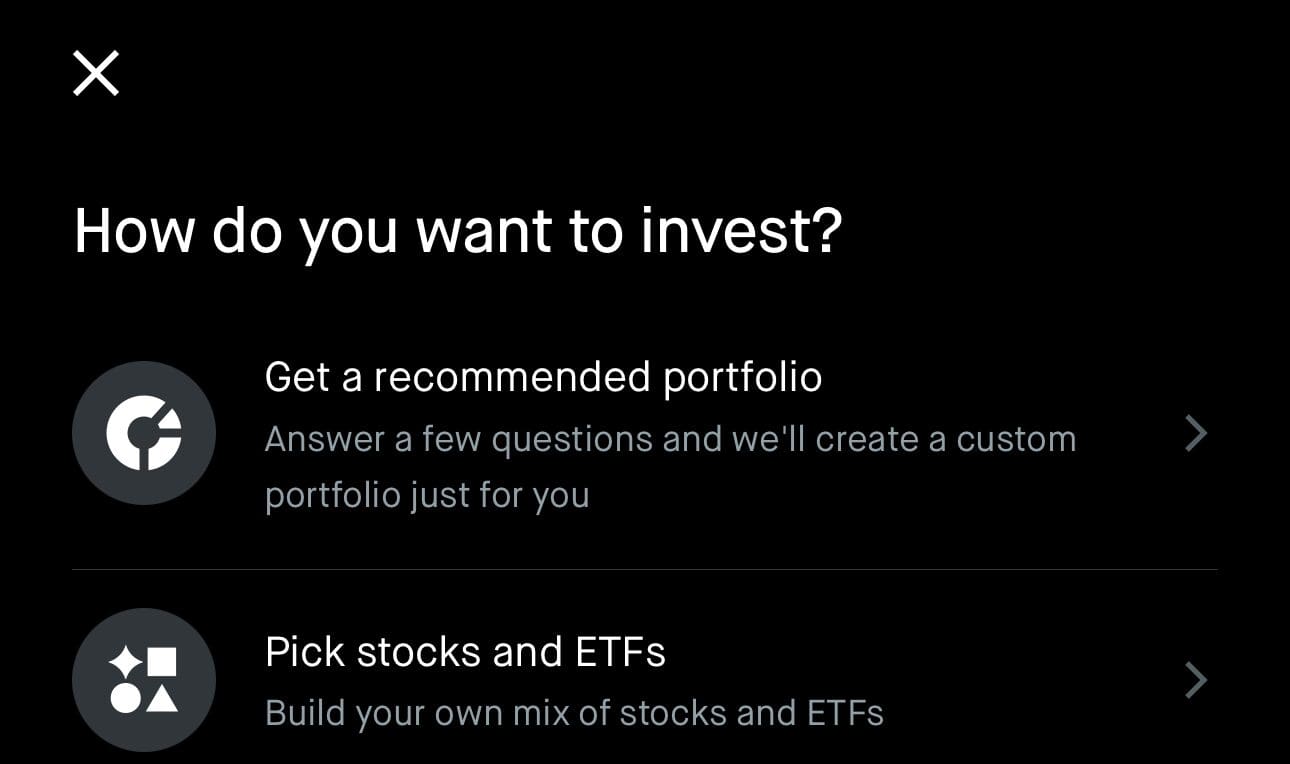
This makes Robinhood better suited for those who prefer hands-on control of their portfolios or are more interested in active trading rather than automated, long-term investing.
-
Retirement Accounts
While IBKR offers more options investment options for retirement accounts, Robinhood has some great perks which is not available on IBKR.
Robinhood offers a straightforward approach to retirement investing, making it easy for users to open traditional, Roth, or rollover IRAs.

One of Robinhood's standout features is its IRA match, even for non-employer plans. This match, which can go up to 3% for Gold members, is a unique offering that adds extra value to retirement savings, especially for those just getting started.
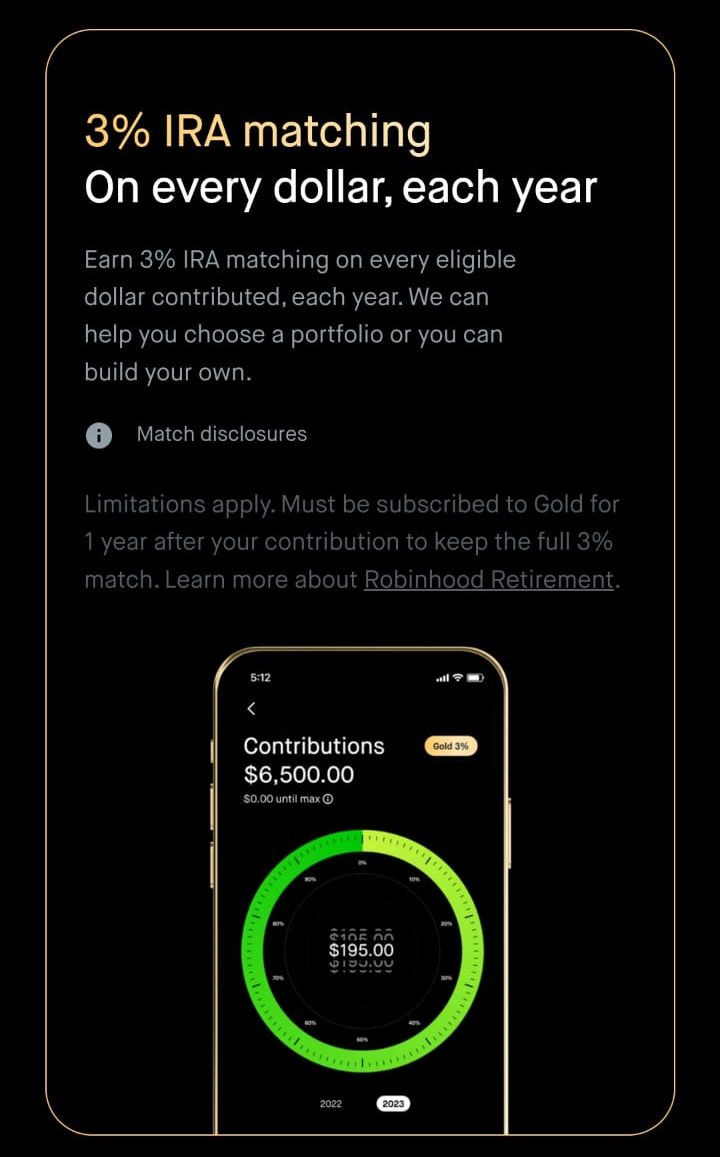
Interactive Brokers (IBKR) offers a variety of Individual Retirement Account (IRA) types, including Traditional, Roth, SEP, SIMPLE, and Inherited IRAs. These accounts are available in either cash or margin formats.

IBKR surpasses Robinhood in the variety of account types and investment options, making it better suited for investors looking for a more sophisticated and customizable retirement strategy.
-
Fees
When it comes to fees, there is no clear winner – both Robinhood and IBKR are considered among the cheapest brokers in the industry.
Robinhood is known for its commission-free trading, making it a cost-effective option for those who want to trade stocks, ETFs, and cryptocurrencies without incurring fees. However, there is a monthly fee to leverage your options with Robinhood Gold.
While Interactive Brokers is not always commission-free, it offers very low trading fees, particularly for active traders. IBKR provides both tiered and fixed pricing models, which can be more cost-effective for high-volume traders or those dealing in international markets.
Robinhood | Interactive Broker | |
|---|---|---|
Fees | $0 – $6.99
$0 for basic account, $6.99 for Robinhood Gold | 0% – 0.75%
$0 online commission on U.S. listed stocks and ETFs, Options: $0.15 – $0.65 per-contract, Futures: $0.25 – $0.85 per-contract. For Interactive Advisors: asset-based management fees of 0.10% to 0.75% |
When it comes to Robo Advisory, the Interactive Brokers fee depends on the chosen portfolio and can be anywhere between 0.10% to 0.75%.
-
Cash Management And Savings Rates
When it comes to banking options, only Interactive Brokers offers cash management accounts. Both brokers offer competitive rates on uninvested cash (you should have Robinhood Gold to get the high rates).
Robinhood | IB Universal Account | |
|---|---|---|
Savings APY | 3.75%
| 0.00% – 3.190%
|
IBKR’s Universal Account offers a more investment-focused approach with its cash management features. While IBKR provides a Bank Deposit Sweep Program with FDIC insurance up to $2.5 million, it is primarily designed for investors who want to maximize their uninvested cash within a trading context.
Robinhood customers can earn competitive interest rates on uninvested cash, and the funds are FDIC-insured through partner banks.
The Robinhood Cash Card also provides everyday rewards, making it appealing for users who want to earn while they spend, with features like 5% cash back on travel booked through Robinhood's portal.
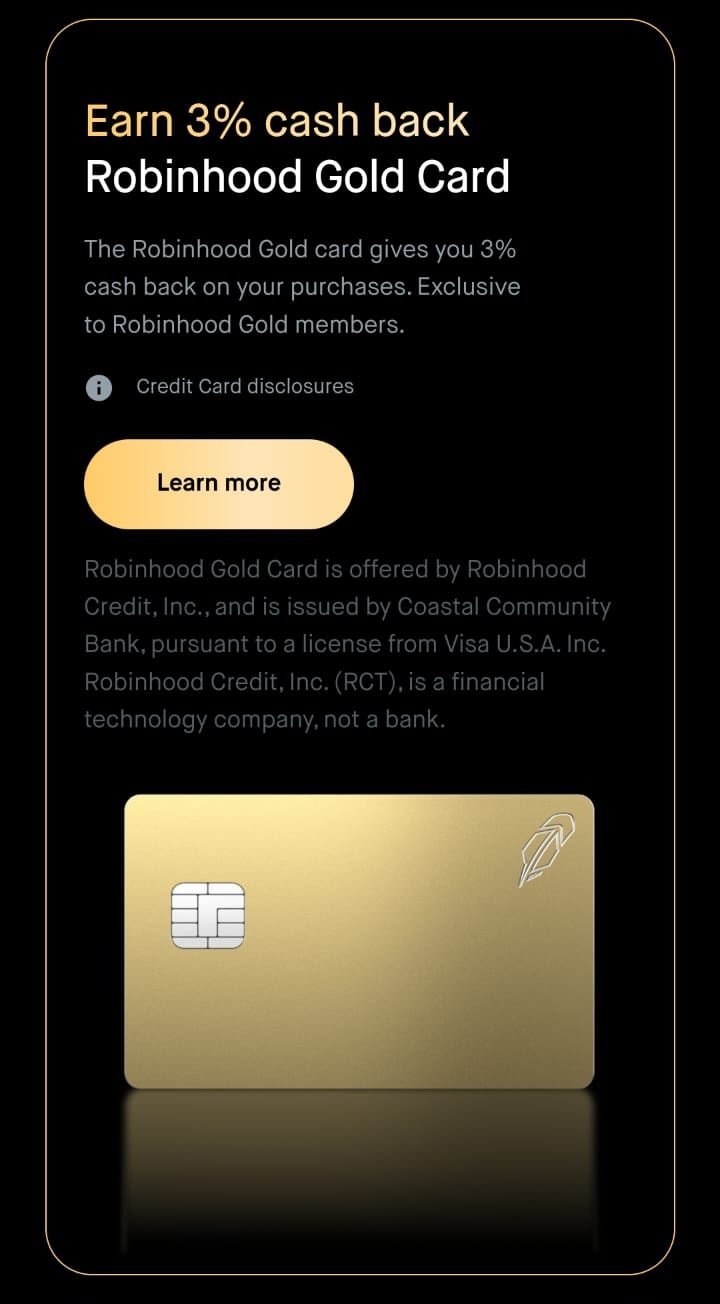
Bottom Line
While Robinhood is an excellent choice for beginner and casual investors, Interactive Brokers is better suited for experienced and active traders or investors looking for a wide range of investment options. Both brokers are known for their cheap fee models.
Interactive Brokers vs. Other Trading Platforms
Schwab provides broader tools and analysis options for long-term, value investors, while Interactive Brokers is more suited to active traders
Schwab vs. Interactive Brokers: Which Brokerage is Right for You?
Vanguard provides more options for investors, while Interactive Brokers offers superior technical tools for active traders
Vanguard vs. Interactive Brokers: Which Brokerage is Right for You?
If you're an experienced investor or trader, IBKR may be a better option. If you're a Chase customer or prefer simplicity, consider JP Morgan.
Interactive Brokers vs. J.P. Morgan Self-Directed Investing: Which Broker Wins?
Both platforms have great options for investors, but Fidelity excels in comprehensive retirement planning and cash management options
Interactive Brokers vs. Fidelity: Which Brokerage Suits Your Investing Style?
Webull offers user-friendly tools and perfect app design, while IBKR is best suited for more experienced investors and global market access.
Interactive Brokers vs. Webull: Compare Brokerage Account Options
Merrill Edge stands out for its interface and integration with BofA, but IBKR is the ultimate winner for trading and investing. Here's why:
Interactive Brokers vs. Merrill Edge: Compare Brokerage Account Options
IBKR shines with its advanced trading tools and extensive market access. E-trade wins for retirement accounts, wealth management, or banking.
Interactive Brokers vs. E-Trade: Compare Brokerage Account Options
Compare Robinhood Side By Side
Schwab offers more options for investors, including robo advisors and wealth management, while Robinhood is best for beginners and traders.
Schwab vs. Robinhood: Which Brokerage is Right for You?
Vanguard offers more options for investors, including retirement, robo advisors, and wealth management, while Robinhood is best for traders.
Merrill Edge is best for long-term investments, including retirement, while Robinhood is perfect for active traders who value simplicity.
Merrill Edge vs. Robinhood: Compare Brokerage Account Options
JP Morgan wins when it comes to fundamental investing tools, but Robinhood is better for technical analysis and trading. Here's why:
J.P. Morgan Self-Directed Investing vs. Robinhood : Compare Brokerage Accounts
Fidelity is our winner for diversified long-term investing, while Robinhood shines in cost-effective options for active traders and beginners.
Robinhood is best for low-cost platform for various trading needs, including Crypto. Etrade is better for one stop shop, including banking.
Robinhood is best for traders looking for easy, cost-free trading, while Stash is great for beginner investors who need a financial management tool
While Robinhood caters to traders and advanced investors, Acorns focuses on automated investing and banking. Here's our full comparison.
Webull is better suited for experienced traders needing advanced tools, whereas Robinhood caters to beginners and those who prefer simplicity.


